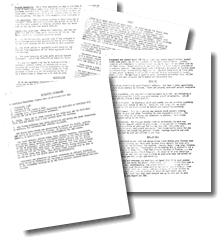DEPARTMENT OF THE ARMY
HEADQUARTERS; 1ST BATTALION, 92D ARTILLERY
APO SAN FRANCISCO 96318
Welcome to the 1st Battalion, 92d Artillery. As a new member of the 1/92d Arty it will be a great asset to you to learn the proud heritage of the fighting "Red Devils". The following is a short summary of the History of your unit.
The 92d was first formed in October 1933. It was an inactive unit of Regular Army at this time, and was called the 92d Field Artillery Regiment. During January 1942, it was activated and re-designated the 92d Field Artillery Battalion. Originally a 105mm Self-Propelled Unit assigned to the 2d Armored Division the Battalion with the rest of the 2d Armored Division landed at Casablanca on 24 December 1942. It stayed in Africa supporting forces to the north until 1943 when it received order to embark for England.
Upon arrival in England the battalion conducted vigorous training for a special mission which culminated in the landing at Omaha Beach on June 12. During the initial landing the battalion was subject to intense air attacks by the German Air Force. In response to the enemy's attacks the battalion returned fire, firing the first round 1 July 1944 at Cahagnalles, France. The 92d Armored Field Artillery Battalion played a major role in the US Forces breakthrough of the German defenses at St. Lo. In their first month of combat, the entire battalion was awarded the Presidential Unit Citation. This was for the gallantry and brilliance with which the battalion performed its mission from 25 to 30 July 1944. During this period, the battalion supported the US Forces march to the southwest. In this action, the battalion was part of a special combat force of the 2d Armored Division which was eventually be know as "Hell on Wheels". The Battalion aided in the defeat of the German Army in France, and crossed Belgium in nine days. The 92d received a commendation from Holland, and entered Germany on 1 October 1944. On 11 November 1944, it participated in the push to the Roer River, where it stayed until the advent of the Bulge in mid December. On 21 December, the battalion headed south with the 2d Armored Division to intercept the point of the German advance, where the division was instrumental in stopping and throwing back the famous offensive. The Battalion crossed the Roer and moved on where they linked up with the Russians on the banks of the Elbe. The Battalion, when its combat mission ended, started occupation duty in Berlin on 4 July 1943.
During the period 1945-50, the 92d returned to the states and in May 1947 was reduced to negative strength. Again in January 1949, the 92d was brought to full strength and was designated as the medium battalion for the 2d Armored Divisions "Hell on Wheels". When the Korean fighting started, a name was picked for the battalion's image and to this day remains the "Red Devils". During the Korea an war the 92d was one of the two medium armed field artillery battalions.
The unit left San Francisco 12 August 1950. It arrived in Japan under strength and was filled with 200 Republic of Korea soldiers. After a training period in Japan, the battalion followed the 7th Infantry Division in the Inchon landing on 20 September 1950, and became a Corp Artillery Battalion in IX Corps. On 25 September 1950 at Suwan Airfield, the first of more than 300,000 rounds were fired. It was in 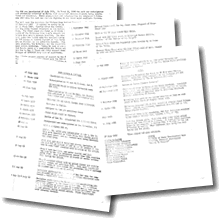 all major actions of the war after 20 September 1950. In all the unit participated in nine major campaigns of the Korean conflict, and supported eight different American and four Republic of Korea divisions. After the Korean war, the 92d was inactivated 27 July 1956. On March 31, 1958 the unit was re-designated and eventually activated in Europe with concurrent, organic elements being constituted and activated. final organization and re-designation was completed 5 February 1968 when the unit was already fighting in its third major conflict - Vietnam.
all major actions of the war after 20 September 1950. In all the unit participated in nine major campaigns of the Korean conflict, and supported eight different American and four Republic of Korea divisions. After the Korean war, the 92d was inactivated 27 July 1956. On March 31, 1958 the unit was re-designated and eventually activated in Europe with concurrent, organic elements being constituted and activated. final organization and re-designation was completed 5 February 1968 when the unit was already fighting in its third major conflict - Vietnam.
The unit made its departure for Vietnam from the Oakland Terminal on the USN Gordon, 13 February 1967. It arrived by convoy to its present location at Artillery Hill on 11 March 1967. Shortly after the arrival the unit quickly became engaged with its big 155mm (towed) Howitzers in the defense of the Northern Two Corps Tactical Zone. The first round was fired on 19 March 1967 against cave and bunker complexes north of the Battalion base camp's present location. The mission of the 1st Battalion, 92d Artillery today has varied with the tactical scheme of maneuver. From direct support of RVN forces to General Support of Free World Forces, the missions of the unit are as flexible as the situation demands. Fighting both the weather and the natural elements, the battalion has the reputation of doing the best job under the most severe hardships. Moving by road or air presents no great obstacles to the Red Devils which is a completely Air Mobile organization. We have moved from Dak Pek to Ban Me Thuot and fired support from Ben Het to Duc Lap to the Southern Fringes of IFFORCEV Arty area of operations.
The 1/92d's present mission of support to the Free World Military Forces reflects the great responsibility placed upon the 92d Artillery and truly upholds the motto of the Brave Cannons by providing aggressive, professional, and timely fires for those who call upon the Red Devils.
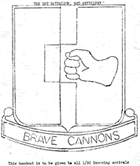
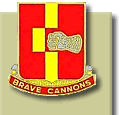

 2. Today our Battalion is deeply embroiled in the fight against communism in the Republic of Vietnam. Our mission is to support Free World Forces by fire and thereby assist in the total pacification effort within our sector of support in the Republic of Vietnam. In addition to artillery fire we provide assistance to Vietnamese military units and the people through training, civic action and provision of all varieties of aid which will lead t improved living conditions and empathy for the government of the Republic of Vietnam at all levels.
2. Today our Battalion is deeply embroiled in the fight against communism in the Republic of Vietnam. Our mission is to support Free World Forces by fire and thereby assist in the total pacification effort within our sector of support in the Republic of Vietnam. In addition to artillery fire we provide assistance to Vietnamese military units and the people through training, civic action and provision of all varieties of aid which will lead t improved living conditions and empathy for the government of the Republic of Vietnam at all levels. all major actions of the war after 20 September 1950. In all the unit participated in nine major campaigns of the Korean conflict, and supported eight different American and four Republic of Korea divisions. After the Korean war, the 92d was inactivated 27 July 1956. On March 31, 1958 the unit was re-designated and eventually activated in Europe with concurrent, organic elements being constituted and activated. final organization and re-designation was completed 5 February 1968 when the unit was already fighting in its third major conflict - Vietnam.
all major actions of the war after 20 September 1950. In all the unit participated in nine major campaigns of the Korean conflict, and supported eight different American and four Republic of Korea divisions. After the Korean war, the 92d was inactivated 27 July 1956. On March 31, 1958 the unit was re-designated and eventually activated in Europe with concurrent, organic elements being constituted and activated. final organization and re-designation was completed 5 February 1968 when the unit was already fighting in its third major conflict - Vietnam. 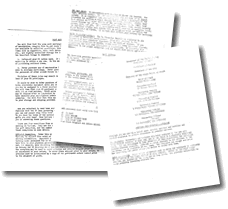 LEGAL ASSISTANCE: Legal advice on matters such as wills and contracts is available at the office of Legal Adviser at Camp Schmidt. Office of the Staff Judge Advocate are located in Nha Trang and at Camp Eneri. SJA provides information in cases primarily involving military law.
LEGAL ASSISTANCE: Legal advice on matters such as wills and contracts is available at the office of Legal Adviser at Camp Schmidt. Office of the Staff Judge Advocate are located in Nha Trang and at Camp Eneri. SJA provides information in cases primarily involving military law.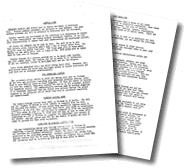 accidents cost the US Government more than 65 million dollars in property damage. Most accidents in USARV were caused by carelessness, unsafe practices, and failure to use common sense. Disregarding safety is like gossip; once unleashed, it cannot be recalled. Stay alert all of the time. If specific safety regulations concerning your job and activities are published-follow them. Drive with care and drive defensively. Don't attempt a physical task beyond your capability-get help. Don't blunder into unfamiliar and conceivably unsafe situations.
accidents cost the US Government more than 65 million dollars in property damage. Most accidents in USARV were caused by carelessness, unsafe practices, and failure to use common sense. Disregarding safety is like gossip; once unleashed, it cannot be recalled. Stay alert all of the time. If specific safety regulations concerning your job and activities are published-follow them. Drive with care and drive defensively. Don't attempt a physical task beyond your capability-get help. Don't blunder into unfamiliar and conceivably unsafe situations.